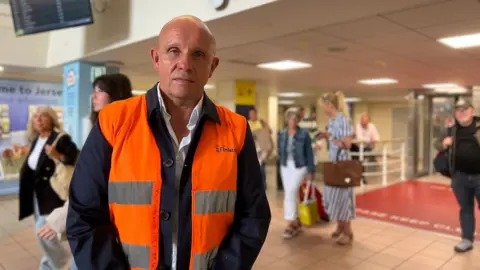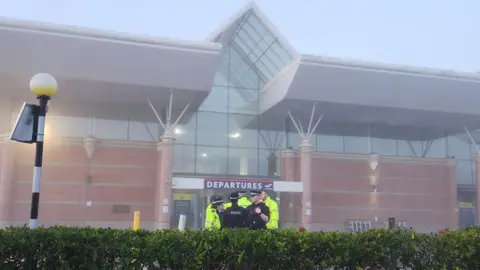- Bonds
Trump pushes Israel and Iran to preserve ceasefire
时间:2010-12-5 17:23:32 作者:Football 来源:Video 查看: 评论:0内容摘要:Gunmen opened fire on a group of people who had stayed behind in the central square of the village of San Bartolo de Berrios after an event organised by the local parish.Gunmen opened fire on a group of people who had stayed behind in the central square of the village of San Bartolo de Berrios after an event organised by the local parish.
The first sustained attempt to reduce immigration was the 1971 Immigration Act, introduced by Prime Minister Edward Heath. In 1948, the former troopship Empire Windrush had docked at Essex carrying 492 migrants from the West Indies, attracted by the jobs boom created by postwar reconstruction. Almost a million more followed in the years ahead, from the Caribbean, India, Pakistan and Africa. They all arrived as citizens of the UK and Commonwealth (CUKC) with an automatic and legal entitlement to enter and stay. The 1971 Act removed this right for new arrivals.The Act was sold to the public as the means by which immigration would be reduced to zero. But from 1964 to 1994, immigrants continued to arrive legally in their thousands.

In 1978 Mrs Thatcher, then in opposition, told a television interviewer that "people are rather afraid that this country might be rather swamped by people with a different culture", and she promised "to hold out the clear prospect of an end to immigration".Not a reduction; an end.Yet today, almost 17% of the population of the UK was born abroad, up from 13% in 2014.

Sir Keir's plan does not promise to end immigration. It is much less radical. It promises to reduce legal immigration by toughening visa rules. As part of the changes, more arrivals - as well as their dependents - will have to pass an English test in order to get a visa. Migrants will also have to wait 10 years to apply for the right to stay in the UK indefinitely, up from five years."It will bring down [net immigration] for sure," says Madeleine Sumption, director of the Migration Observatory at the University of Oxford. "If you restrict eligibility for visas, you will have lower migration. The Home Office calculation is that it will issue 98,000 fewer visas. That's in the order of 10%. It's not radical but it is a change."

The White Paper also proposes to end visas for care workers. "This has been a visa that has been incredibly difficult for the government to manage," says Sumption. "It's been riddled with problems. There has been widespread fraud and abuse and so it's not surprising that they want to close it. The care sector will face challenges continuing to recruit. But I think closing the care route may be helpful for reducing exploitation of people in the country."
Just a week after publishing the White Paper, the government was accused of undermining its own immigration strategy by agreeing in principle to a "youth experience scheme" with the EU - which may allow thousands of young Europeans to move to Britain for a time-limited period. Champions of the policy say it will boost economic growth by filling gaps in the labour market. But ministers will be cautious about any potential inflation to migration figures. It's another example of the narrow tightrope prime ministers have historically been forced to walk on this issue.Fast forward 18 years and Williamson will take to the pitch for Saturday's showpiece event against Barcelona as one of the Gunners' key players.
Arsenal drew 0-0 that day at Meadow Park but beat Swedish side Umea 1-0 over a two-legged final to be first and only time an English club has lifted the trophy."I remember Borehamwood rocking," Williamson told BBC Sport's Jo Currie. "I just remember there being people everywhere. I was annoyed I walked out with the away team which wasn't part of the plan.
"I remember watching with all my team-mates and in my head that was the most normal thing in the world - Arsenal were going to go and win, which I think is a beautiful thing to grow up with as a fan."It was a good day. I remember it for the club and for everybody. I just remember everyone being very happy which is what trophies do."
- 最近更新
- 2025-07-07 09:37:02Suicide bombing kills 22 inside Damascus church
- 2025-07-07 09:37:02Deadly superbugs thrive as access to antibiotics falters in India
- 2025-07-07 09:37:02People say cola and fries are helping their migraines - but there's a twist
- 2025-07-07 09:37:02Ukraine's audacious drone attack sends critical message to Russia - and the West
- 2025-07-07 09:37:02UK to build up to 12 new attack submarines
- 2025-07-07 09:37:02Customers furious after Game cancels Nintendo Switch 2 pre-orders
- 2025-07-07 09:37:02Israel attacks Iran’s Arak reactor as Iranian missile hits Israeli hospital
- 2025-07-07 09:37:02Cancer drug which could 'double survival time' rolled out
- 热门排行
- 2025-07-07 09:37:02My Favorite Tomato Sandwich Takes 3 Minutes To Make
- 2025-07-07 09:37:02Fed starts to split on when to begin cutting US interest rates
- 2025-07-07 09:37:02charging you more as a result of your loyalty
- 2025-07-07 09:37:02Trump has opened a Pandora’s box
- 2025-07-07 09:37:02How to use dollar-cost averaging to balance investment risks and rewards
- 2025-07-07 09:37:02Customers furious after Game cancels Nintendo Switch 2 pre-orders
- 2025-07-07 09:37:02Bill Nighy, Mathew Horne, WWE’s Jordynne Grace Board Fantasy Film ‘Welcome to Paradis…
- 2025-07-07 09:37:02Photos: Israel and Iran trade strikes for a third day
- 友情链接
- Amid US-Pakistan thaw, two key challenges: Iran and China Niger to nationalise uranium mine operated by French state-affiliated firm Al Jazeera Centre for Public Liberties & Human Rights Real Madrid beat Pachuca at Club World Cup despite Asencio’s early red card Are commercial interests driving Uganda’s military operations in DR Congo? .css-v2kfba{height:100%;width:100%;} India says it will ‘never’ restore Indus Waters Treaty with Pakistan US bombs Iran: What we know about US strikes on Iran’s nuclear facilities Pakistanis flee Iran amid Israel-Iran war border closure Sounds familiar: Was this said about Iraq in 2003, or Iran in 2025? Trump’s Pakistan embrace: ‘Tactical romance’ or a new ‘inner circle’? Lone survivor of Air India crash mourns brother Why India refused to join SCO condemnation of Israel’s attacks on Iran Key players tangle at UNSC at ‘perilous turn’ of US-Israel-Iran conflict Kenya police officer arrested over blogger’s death in custody Clashes injure 11 as Kenyans protest death of blogger in police custody The Netherlands returns 119 stolen sculptures to Nigeria IAEA says extent of damage at Fordow still unknown At least 270 bodies recovered from Air India crash site in Ahmedabad US attacks Iran: How Trump rejoined ‘team’ Netanyahu India-Pakistan matches confirmed at ICC Women’s World Cups in 2025 and 2026 Emotional South Africa beat Australia sealing first major cricket title Lone survivor of Air India crash mourns brother Emotional South Africa beat Australia sealing first major cricket title US lawmakers condemn Trump for ‘unconstitutional’ attack on Iran US strikes Iran, what comes next? Which teams are in the Club World Cup knockouts, and who can still make it? Ten-man Real Madrid beat Pachuca 3-1 for first win of Club World Cup India-Pakistan matches confirmed at ICC Women’s World Cups in 2025 and 2026 Is Trump planning an ‘Africa visa ban’?
